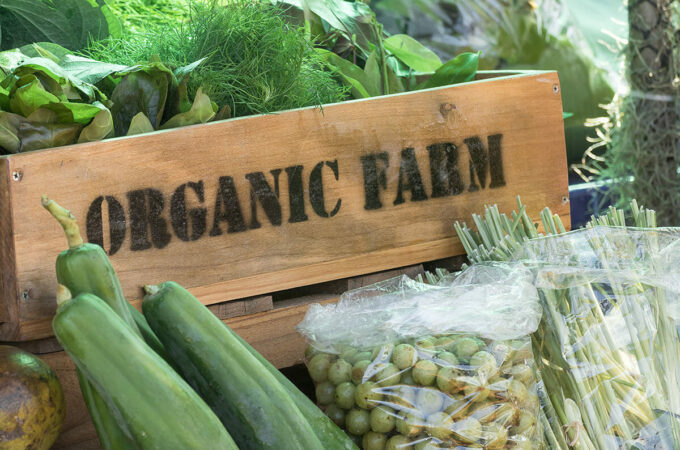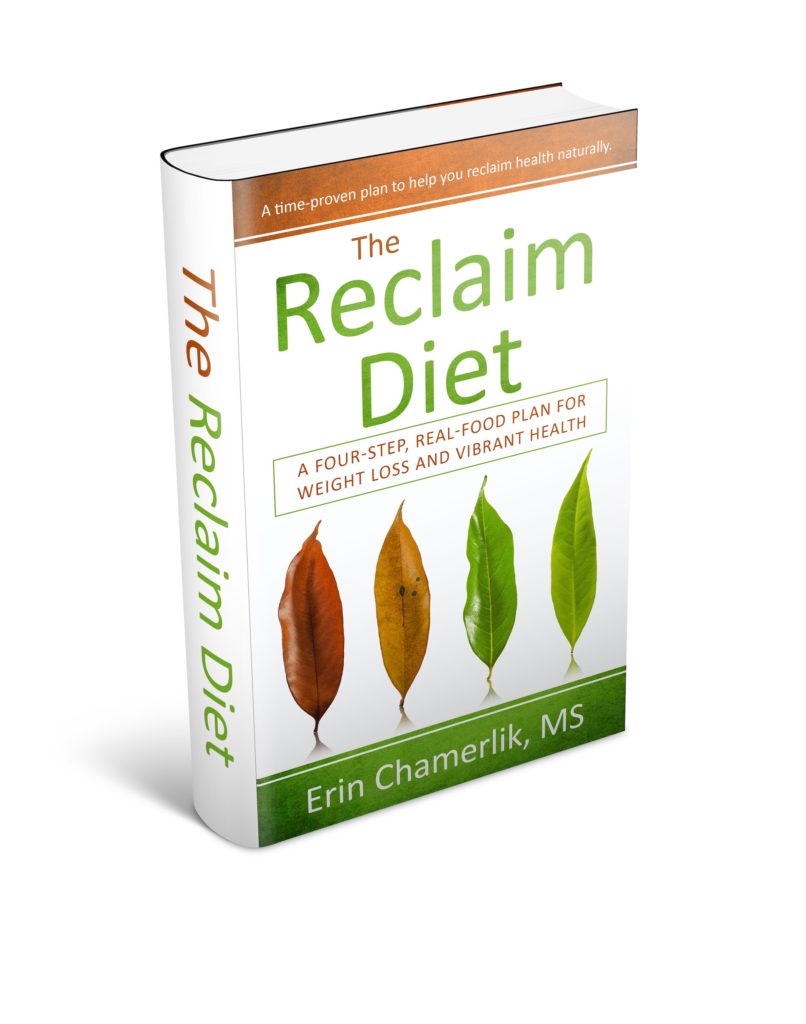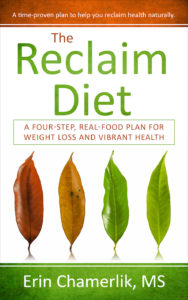
Grocery Shopping Guide
Stocking your kitchen to prepare for your real food journey is an important step for success. Try to plan three to seven days at a time when shopping. Meat, fish and chicken can always go in the freezer if you find a bargain. Until you get a feel for how much fresh produce you will be eating, you may want to plan your menu and meals for three days and only buy what is on the plan.
Does Everything Need to be Organic?
In the beginning when you are just starting out, don’t worry too much about organic foods if it is difficult for you to source. First, simply focus on eating nutritious real food. As you progress on your journey, you can begin to scout out better quality foods and sources for organic animal protein and produce. Visit EWG.org/foodnews and download “EWG’s Shopper’s Guide to Pesticides in Produce.” Buying organic versions of the “Dirty 12” (strawberries, spinach, kale, nectarines, apples, grapes, peaches, cherries, pears, tomatoes, celery and potatoes) helps you skip toxic chemicals. Buying conventional versions of the “Clean 15” (avocados, onions, asparagus, cabbage, cauliflower, broccoli, mushrooms and others) helps your wallet.
Animal Protein
The majority of your food budget is spent on high quality animal protein.
When the budget allows, choose grass-fed or organic meats and free-range (pasture-raised) poultry to avoid residues from antibiotics and pesticides.
Beef, pork, lamb, venison, wild game, bison
- Beef, ground and all cuts such as roasts, ribs, steaks and tips
- Pork, bacon, ham and sausage, roasts, ribs, loin, chops or steaks
- Lamb
- Venison and other wild game
- Bison
Poultry and Eggs
- Chicken – whole or parts
- Turkey – whole or parts
- Duck – whole or parts
- Other birds such as quail, Cornish hens, goose, ostrich
- Organic, pasture-raised eggs are nutrient dense and an inexpensive protein option
Deli Meats – Organic when possible
- Cold cuts such as turkey, chicken, ham
- Pepperoni slices
- Salami
- Prosciutto
Seafood
- Fresh or frozen fish of any kind, wild caught is best
- Canned fish such as sardines, tuna and salmon, water or oil packed (ideally olive oil or avocado oil)
- Fresh or frozen shellfish such as shrimp, scallops or crab
Vegetables – go for variety, and choose colorful options
- Bell peppers
- Broccoli
- Cucumbers
- Cabbage
- Cauliflower
- Green Beans
- Asparagus
- Brussels sprouts
- Celery
- Tomato
- Mushrooms
- Lettuce: large leaves can act as the “bread” for sandwiches (all varieties except iceberg)
- Leafy green vegetables (avoid eating spinach, Swiss chard and beet greens routinely due to oxalates)
- Onions, leeks and garlic, for flavorful cooking
- Root vegetables: carrots, beets, turnips, parsnips, rutabaga, sweet potato, radish, Jerusalem artichoke, yam
- Sprouts for salads
- Squash – zucchini, yellow, spaghetti, butternut
Nuts and seeds – raw, dry roasted, or sprouted
- Nuts: almonds, hazelnuts, pecans, walnuts, macadamia, pistachios, pine nuts, Brazil nuts (watch consumption of nuts as they are high in oxalates, especially almonds and cashews)
- Nut flours like coconut flour and almond flour
- Seeds: sunflower, pumpkin
Fruit (0 to 3 servings per day)
- Avocados
- Coconut
- Choose lower sugar fruits that are high in nutrition like berries, tangerine, oranges, coconut, peaches, cantaloupe, apples, cherries, lemon, lime, olives, passion fruit and persimmon.
- Limit high-carb fruits: bananas (1/2 banana is a serving) and plantains (1/4 is a serving), watermelon (1-2 cups), pineapple (½ cup) papaya (½ cup), mango (½ cup)
- Dried fruit is not recommended. It is very sugary and often contaminated with mold.
Fats
- Organic butter, Kerrygold butter, Organic Valley
- Organic ghee
- Extra-virgin olive oil
- Avocado oil
- Macadamia nut oil
- Coconut oil, unrefined, raw
- Canned coconut milk (full fat)
- Mayonnaise (avocado oil or coconut oil, such as Chosen Foods)
Pantry Items (organic when possible)
- Tomato products, marinara sauce, sun-dried tomatoes in oil
- Bubbies sauerkraut, dill pickles (refrigerated section of the produce department)
- Green chiles, roasted red peppers, chipotle peppers, mushrooms, artichoke hearts, hearts of palm
- Chicken, beef and vegetable stock, bone broth (gluten-free, organic)
- Nut and seed butters (natural, unsweetened)
- Ketchup (organic, limited use as it is high in sugar)
- Mustard (stone ground mustard, gluten-free)
- Raw apple cider vinegar, balsamic vinegar, wine vinegar
- Hot sauces (TABASCO®, Frank’s® RedHot, sriracha)
- Most salsas (read ingredients)
- Coconut aminos, Coconut Secret (gluten-free, soy-free replacement for soy sauce)
- Mayonnaise (full fat, avocado- or coconut oil-based)
- Salad dressings, ideally homemade using olive or avocado oil
- Capers
- Horseradish (not horseradish sauces)
- Olives (look for olives in salt and water, like Lindsay Naturals)
- Beef sticks or jerky (PaleoValley.com, or Nicks-Sticks.com)
- Canned coconut milk, full fat like Natural Value or Native Forest
- Shredded coconut, unsweetened
- Coconut butter
- Bragg nutritional yeast
- Unrefined mineral salt (Redmond Real Salt® has 60+ trace minerals and no additives)
Cooking and Baking Ingredients
- Grass-fed collagen for smoothies
- Sweet Leaf liquid stevia drops
- Pepper, Real Salt, cinnamon, garlic powder, chili powder, cayenne, oregano, basil, thyme, cumin, onion powder (organic)
- Raw honey
- Unrefined maple syrup
Read more: Get The Reclaim Diet

Recommended
-
Dandelion for Liver Support and Health BenefitsJuly 20th, 2024
-
Modified Citrus PectinJuly 11th, 2024
-
Bentonite Clay Mask for Face and ArmpitsJuly 8th, 2024
-
Two Supplements for Erectile DysfunctionJune 30th, 2024








